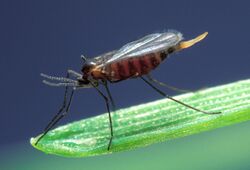Biology:Sciaroidea
| Sciaroidea | |
|---|---|

| |
| The Hessian fly (Mayetiola destructor, Cecidomyiidae) | |
| Scientific classification | |
| Domain: | Eukaryota |
| Kingdom: | Animalia |
| Phylum: | Arthropoda |
| Class: | Insecta |
| Order: | Diptera |
| Infraorder: | Bibionomorpha |
| Superfamily: | Sciaroidea |
Sciaroidea is a superfamily in the infraorder Bibionomorpha. There are about 16 families and more than 15,000 described species in Sciaroidea. Most of its constituent families are various gnats.
Description
As nematoceran flies, sciaroid adults generally have long segmented antennae, while their larvae have a well-developed head and mouthparts.[1]
Aside from this, sciaroids vary in appearance. For example, Sciaridae adults have each eye extended dorsally to form an "eye bridge", a feature not found in related families.[2] Cecidomyiidae adults have a distinctive reduced wing venation, while their larvae are atypical for nematoceran larvae in having a very small head capsule.[3]
Ecology
Most fungus gnats (Sciaroidea excluding Cecidomyiidae) live in forests with their larvae occurring in fungi, dead wood and soil. There are some which live in wetlands such as fens.[4] Several genera of Sciaridae and Mycetophilidae may reach high abundances in damp buildings with wet organic matter.[5]
Some species of Sciaridae and Cecidomyiidae are among the rare Diptera that spend their entire lives in soil. These are wingless as adults.[6]
Sciaroid larvae typically feed on fungi but there are some which form plant galls (many Cecidomyiidae) or prey on other invertebrates (Keroplatidae).[citation needed]
Phylogeny
A 2016 molecular phylogenetic analysis confirmed that Sciaroidea is a monophyletic group and should include both Cecidomyiidae and Ditomyiidae.[7]
Families
These 15 families belong to the superfamily Sciaroidea:[8]
- Bolitophilidae Meigen, 1818
- Cecidomyiidae Newman, 1835 – gall midges and wood midges, sometimes excluded from Sciaroidea
- Diadocidiidae Winnertz, 1863
- Ditomyiidae Kylin, 1919
- Keroplatidae Rondani (incl. Lygistorrhinidae Edwards, 1925) – long-beaked & predatory fungus gnats
- Mycetophilidae Newman, 1834
- Rangomaramidae Jaschhof and Didham, 2002 – long-winged fungus gnats[9]
- Sciaridae Billberg, 1820 – dark-winged fungus gnats
- † Antefungivoridae Rohdendorf, 1938
- † Archizelmiridae Rohdendorf, 1962
- † Eoditomyiidae
- † Mesosciophilidae
- † Paraxymyiidae Rohdendorf, 1946
- † Pleciofungivoridae Rohdendorf, 1946
- † Protopleciidae
References
- ↑ "Suborder Nematocera - Flies (Order: Diptera) - Amateur Entomologists' Society (AES)". https://www.amentsoc.org/insects/fact-files/orders/diptera-nematocera.html.
- ↑ "Diptera | What Bug Is That?". https://anic.csiro.au/insectfamilies/biota_details.aspx?OrderID=26547&BiotaID=46275&PageID=families.
- ↑ "Diptera | What Bug Is That?". https://anic.csiro.au/insectfamilies/biota_details.aspx?OrderID=26547&BiotaID=46269&PageID=families.
- ↑ Salmela, Jukka; Kolcsár, Levente-Péter (2017-06-03). "New and poorly known Palaearctic fungus gnats (Diptera, Sciaroidea)" (in en). Biodiversity Data Journal 5 (5): e11760. doi:10.3897/BDJ.5.e11760. ISSN 1314-2828. PMID 28325987. PMC 5345105. https://bdj.pensoft.net/article/11760/.
- ↑ Gibb, Timothy (2015), "Pest Insects" (in en), Contemporary Insect Diagnostics (Elsevier): pp. 153–245, doi:10.1016/b978-0-12-404623-8.00005-3, ISBN 978-0-12-404623-8, https://linkinghub.elsevier.com/retrieve/pii/B9780124046238000053, retrieved 2022-10-20
- ↑ Frouz, Jan (1999), "Use of soil dwelling Diptera (Insecta, Diptera) as bioindicators: a review of ecological requirements and response to disturbance" (in en), Invertebrate Biodiversity as Bioindicators of Sustainable Landscapes (Elsevier): pp. 167–186, doi:10.1016/b978-0-444-50019-9.50013-3, ISBN 978-0-444-50019-9, https://linkinghub.elsevier.com/retrieve/pii/B9780444500199500133, retrieved 2022-10-20
- ↑ Ševčík, Jan; Kaspřák, David; Mantič, Michal; Fitzgerald, Scott; Ševčíková, Tereza; Tóthová, Andrea; Jaschhof, Mathias (2016-10-18). "Molecular phylogeny of the megadiverse insect infraorder Bibionomorpha sensu lato (Diptera)" (in en). PeerJ 4: e2563. doi:10.7717/peerj.2563. ISSN 2167-8359. PMID 27781163.
- ↑ Greenwalt, D.; Kjærandsen, J. (2019). "Fungus Gnats Online". http://sciaroidea.info/taxonomy/40255.
- ↑ Jaschhof, M.; Didham, R. K. (2002). "Rangomaramidae fam. nov. from New Zealand and implications for the phylogeny of the Sciaroidea (Diptera: Bibionomorpha)". Studia Dipterologica Supplement 11: 1–60.
External links
Wikidata ☰ Q3952308 entry
 |

